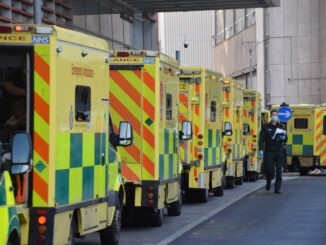
As reported by the BBC, extreme disruption to NHS services has been driving a sharp spike in heart disease deaths since the start of the pandemic, a charity has warned
The British Heart Foundation (BHF) said ambulance delays, inaccessible care and waits for surgery are linked to 30,000 excess cardiac deaths in England and has called for a new strategy to reduce ‘unacceptable’ waiting times.
The government has said it is investing another £500m to ease pressure on ambulances and boost hospital capacity.
The BHF said its analysis suggests 395,000 people in England could be on a waiting list for a heart test or procedure by April 2023 based on current trends, up from 224,000 before the start of the Covid pandemic.
New analysis of the mortality data by the BHF suggests heart disease is among the most common causes, responsible for 230 deaths a week above expected rates since February 2020.
The charity said ‘significant and widespread’ disruption to heart care services was driving the increase.
Its analysis of NHS data showed that 346,129 people were waiting for time-sensitive cardiac care at the end of August 2022, up 49% since February 2020.
It said 7,467 patients had been waiting more than a year for a heart procedure – 267 times higher than before the pandemic.
At the same time, the average ambulance response time for a suspected heart attack has risen to 48 minutes in England against a target of 18 minutes, according to the latest NHS figures.
The BHF said difficulty accessing face-to-face GP and hospital care may have also contributed to the rise.
It cited modelling from NHS England which suggested the drop in people having their blood pressure checked because of Covid could lead to an extra 11,190 heart attacks and 17,702 strokes over three years.
Dr Charmaine Griffiths, the BHF’s chief executive, said: “It is devastating that the ongoing and extreme disruption to heart care has meant that 30,000 more families have lost a loved one.
“Many hundreds of thousands of people fear that their heart condition could get worse before they get treatment – potentially stopping them from working or enjoying a full life. Many more are completely unaware they now have a condition putting them at a greater risk of early death from a heart attack or stroke.”
The charity is calling for a new national heart strategy to cut waiting times for GP appointments, address staff shortages in cardiac care and increase investment in medical research.
The Department of Health said the NHS has made progress tackling the longest treatment backlogs with waits of more than two years ‘virtually eliminated’.
A spokesperson added: “We’re improving care and outcomes for people with heart disease by opening over 80 community diagnostic centres across the country, which have already delivered over two million additional checks.
“We recognise the pressures ambulances are facing and we’ve set out a range of measures to help ease this, including an extra £500m to speed up discharge and free up hospital beds, reduce waits in A&E and get ambulances quickly back out on the road.”


Be the first to comment